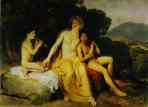Ancient Greek and Roman Myths Notes
Apollo
 Apollo
– a god of the second generation of Olympians, son of Zeus
and Leto, twin brother of the goddess
Artemis
(Diana). There are many legends connected with Apollo. Apollo is
considered to be the god of light, the patron of music and fine arts. In
the retinue of Apollo are Muses and Graces.
Apollo
– a god of the second generation of Olympians, son of Zeus
and Leto, twin brother of the goddess
Artemis
(Diana). There are many legends connected with Apollo. Apollo is
considered to be the god of light, the patron of music and fine arts. In
the retinue of Apollo are Muses and Graces.
See: François Boucher. Apollo
Reveals his Divinity to the Shepherdess Issé.
Karl Brulloff Temple
of Apollo in Phigalia.
Eugène Delacroix Apollo
Slays Python.
Lorenzo Lotto Sleeping
Apollo, Muses and Fama.
Nicolas Poussin. Apollo
and Muses. Apollo and Daphne
A legend about Apollo and Marsyas, the Satyr, who found a flute,
which had been thrown away by Athena.
She had tried to play it but, but realizing how ugly she looked with protruded
mouth, had immediately given it up. When Marsyas found that he could play
nice music with the flute he challenged Apollo and claimed to make sweeter
music with his flute than Apollo with his lyre. Marsyas was the loser and
Apollo first hanged him from a pine tree and then flayed him.
See: Agnolo Bronzino. Apollo
and Marsyas.
Pietro Perugino. Apollo
and Marsyas.
Raphael Apollo and Marsyas;
Jacopo Robusti, called Tintoretto. Contest
Between Apollo and Marsyas.
Titian
The Flaying of Marsyas.
A legend about Hyacinthus tells: Hyacinthus was so beautiful
that Apollo fell in love with him, but one day while they were practicing
throwing discus, Apollo’s discus changed its course and hit Hyacinthus
on the head, killing him at once. Apollo was in grief. To commemorate his
name, he transferred his friend’s blood into a flower.
Cyparissus, a beautiful youth loved by Apollo. His favorite
companion was a sacred stag, which he had tamed. Once Cyparissus inadvertently
killed the stag with his javelin. Full of grief he asked the gods for death.
The gods turned him into a cypress, the tree of sadness.
See: Alexander Ivanov Apollo,
Hyacinthus and Cyparissus Singing and Playing Music.
Apollo and Phaeton. Phaeton was the son of Helios, the god of
the Sun, who every morning started his travel across the sky carrying the
Sun in his chariot. Helios was later associated with Apollo. Phaeton’s
mother, who kept identity of his father in secret, until the boy reached
adolescence, brought him up. Phaeton then came to his father, who was very
glad to see him. In his joy Apollo/Helios granted the son one wish. Phaeton
wanted to go across the sky in father’s chariot. Apollo/Helios tried to
dissuade his son, but the youth stubbornly insisted. At last Apollo/Helios
agreed. At first everything went smoothly, Phaeton managed the horses.
But then he was scared of the height, the monsters of Zodiac frightened
him, he lost the management and lost the route. The chariot dropped too
low and the Sun nearly burnt the Earth. To save it, Zeus struck the boy
with a thunderbolt. His body felt into river Eridanus. Phaeton’s sisters,
the Heliades, wept over him so much, that at the mercy of gods they were
turned into poplars.
Nicolas Poussin. Helios
and Phaeton with Saturn and the Four Seasons.